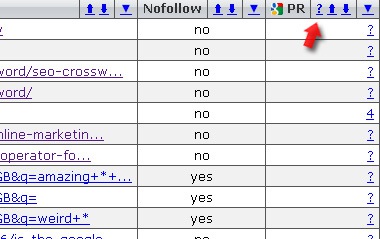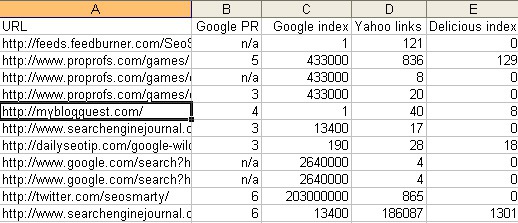Search Engine Journal - 5 new articles
pirámides maquillaje innovacion fiscalidad educacion románico eurovision gótico móvil
"Search Engine Journal" - 5 new articles
- 3 Ways to Quickly Find the Tab You Need (FireFox)
- Im-Portent SEO: My Interview With Ian Lurie
- The 2010 Goals Challenge – Can You Do This?
- How to Extract and Export Links from a Page to Excel
- How to Use Various REL Attributes – Learning Microformats
- More Recent Articles
- Search Search Engine Journal
3 Ways to Quickly Find the Tab You Need (FireFox)
It's like a disease: I always have plenty of tabs open in my FireFox and sometimes it is getting too difficult to control.
I keep tabs open if I want to give something more attention later the same day or if I want not to forget to include the link in the post or discuss it with the friend, etc. I open multiple tabs when doing research or clicking through search engine results.
FireFox tabs help me get orgnized, plan the day or quickly scan huge amounts of information.
Sometimes (often?) it gets really hard to actually find the tab I currently need (especially if there are many tabs from one site with same favicons): so here are the three tools that make that job easier:
Find In Tabs
Find In Tab is an awesome FireFox addon that adds a tiny option to CTRL+F command to search through all open tabs:
- Clicking the "Find in Tabs" button on the find bar will search for text in all open tabs, and show a list of search results.
- Clicking any of the results will jump to the tab on which it was found, and scroll directly to the highlighted text.
URL Lister
URL Lister shows the URLs of all the tabs in a textarea so that it can be copied easily. Just right click any tab and click on the "URL Lister" (or use "Tools > URL Lister") to open up the main dailog. Links can be listed:
- In plain text;
- Together with their titles in HTML;
- Together with their titles in HTML in a list.
Tab Preview
Tab Preview allows to preview tabs on mouseover for you to quickly see what the tab contains:
Check out the SEO Tools guide at Search Engine Journal.
3 Ways to Quickly Find the Tab You Need (FireFox)
Im-Portent SEO: My Interview With Ian Lurie
I first met Ian when he spoke at our SearchFest 2008 event. Though we've communicated frequently via social media, we, more often than not, missed each other at conferences we both attended until Ian, I, Scott Hendison & Ruth Burr had dinner at Pubcon (where Ian taught me that there were as many flavors of salt as there are brands of beer & that archaic video games get new life when played on a High Def TV). Ian not only has a wonderful sense of humor but is a very talented search marketer who expresses smart ideas in his own idiosyncratic way.
Ian will be speaking at SearchFest 2010 which will take place March 9th in Portland, Oregon. Get your tickets now.
1) Please give us your background and tell us what you do for a living.
My background is pretty absurd, really. I went to UCLA Law School, graduated in 1993, and realized I hated law. I mean, not just a mild dislike or a vague feeling of disquiet: I HATED it. So, I started working as a copywriter – I'd always enjoyed writing – and a marketer.
A couple of years later, I told my boss I was leaving to form my own company. He said "Great, we'll be your first client", and I was off and running. The Written Word, Inc. (later renamed Portent Interactive) was born.
Since then (15 years, officially, as of January 7th 2010) I've been running Portent. We're a full-service internet marketing agency, but we focus pretty heavily on SEO, social media and PPC. Those three things drive 70% or so of online commerce, and our clients tend to lean towards them, too.
My own jobs at the company are sales, training our staff and consulting. That's only 3 jobs – far better than 10 years ago, when I had ALL of the jobs.
2) How can you tell an intelligent search marketer / social media consultant (one that you'd feel comfortable trusting your business future to) from one who really sucks?
A good search marketer / social media consultant thinks before they speak. They don't bluff, and they admit that it's not all a science. Plus, they understand MARKETING. Finally, they're all good communicators. How many great SEO/SMO folks do you know who can't write?
The really awful marketers and consultants expose themselves in a hurry: They talk up out-of-date strategies, try to treat the field as an exact science, and can't write to save their lives. And they never improve or learn. Plus, when I meet them I get an immediate desire to hit them with a chair. It's some kind of superpower, I guess.
One thing about that last comment: There's a big difference between a marketer/consultant who's learning and one who sucks.
3) How has search marketing changed in the last year or so and where do you see it going?
Personalized search is the big, nasty monster in the room. It's affected SEO, obviously. But personalized search is going to have a huge impact on how people use the web, and I don't think it'll be a good one.
If the search results are in constant flux, there's no common roadmap for the web. It's chaos, I tell you! Chaos!
I actually think we'll see Google back off a bit on personalized search and real time search this year. But, by the end of the year, people will start trying to find alternative search tools – they'll no longer trust the continuously-shifting stuff Google serves up.
4) Please list some of your top webmaster "Analytics FAILS" and how they can be overcome (in order to increase revenue / leads).
1. No analytics. Yes, I still run into this all the time. Some organizations just never set them up. Others have analytics in the clutches of 1 person who won't let anyone else look at them. Someone has to grow a backbone and demand access to the reports, or demand that the tools get set up.
2. No analysis. Reports aren't analytics! Once you set up Google Analytics or Omniture, you have to interpret the data. 99% of the time, someone shows me the reports their previous consultant sent them, and it's a bunch of exported PDFs from Google Analytics. How the hell is that supposed to help anyone? Step back. Look at the data as a whole, and the story it's telling about your site and your company. Instead of tables and charts, write 3 sentences explaining what you see. You'll learn to be a better observer, and you'll start performing analysis before you know it.
3. No conversion tracking. That's probably self-explanatory.
4. Mechanics. Failure to consider things like subdomains that can impact your data.
5. Substitution of analytics for higher thought. I see a lot of marketing teams turn into vapor-locked monkeys who can't make a single marketing decision without data to back it up. Some folks say that's good. I think it's awful. We're not computers – our marketing strategies shouldn't be decided by computers, either. Use your brain. Go with your gut.
6. Attribution. Everyone counts the first or the last click. They rarely consider what happens in between. That means teams often shut down a campaign that's actually performing. Start looking at your log files, or get a tool like Enquisite Optimizer and use that data to see if an otherwise lousy campaign is a big contributor.
5) You've done a wonderful job developing an online persona which you effectively utilize in blogging and throughout social media. How can an online marketer develop their unique personal brand and stand apart from others in their field?
Heh heh. You have to do what comes naturally. Really, I use Conversation Marketing as the place where I can let it all hang out now and then. That's the secret.
Oh, also: Write a lot. The more practice you get, the easier it is to 'speak' naturally through writing.
6) What would you say to the many search marketers who remain invisible in their industry (even though it's never been easier to be visible)?
Hmmm. That's a tough one. I often feel invisible myself. I guess I'd say you have to take it one client at a time, one blog post at a time. Reach out to bloggers you respect, guest post and interact with them. Try to speak at conferences. It all comes together eventually. I hope. Cough.
7) How do you deal with the many different types of client organizational dysfunction?
Sigh. I'm one of the worst at this. I'm a very passionate advocate for my clients. I want them to grow. Why someone would resist making a simple strategic or tactical change that would make them more money, or get them more votes, is beyond me.
I try very hard to see their perspective, organize and advocate for changes within that perspective, and not create havoc.
I also ride my bike a lot, and occasionally punch solid objects.
And, sometimes I lose my temper.
8) Where does paid search fit into the sales / lead generation spectrum?
To me, paid search is a laser, while organic is a shotgun blast. Both are very effective. Paid search has less of an impact, but it is easier to aim and adjust.
9) Talk about the challenges of hiring and retaining great search marketing employees.
The biggest challenge I see is hiring and retaining great thinkers and learners, and keeping them hungry for more learning. Most people just aren't raised or taught to be intellectually curious, or to be real critical thinkers. So you have to really evaluate folks and look for a sense of excitement about the work.
10) How has the market for search marketing services held up during the "recession" and where do you see it heading as the economy recovers?
I saw a big dip in early 2009, but then things came back stronger in the 4th quarter of 2009. Folks are diverting dollars to search as a 'low cost' alternative. As the economy recovers, I think it'll stay this way. Most organizations are finally figuring out that this whole internet thing isn't just a fad…
Check out the SEO Tools guide at Search Engine Journal.
Im-Portent SEO: My Interview With Ian Lurie

The 2010 Goals Challenge – Can You Do This?
How long have you thought about starting an online business?
What have been the main fears you've overcome to "take the plunge"?
Or are you still debating whether or not online marketing is really for you?
I've consulted with thousands of people on how to start an online business; I've learned a lot about the keys to success.
One of the most important factors that all successful business owners have is not knowledge. It's not money or advanced education. It's not necessarily computer experience or programming and design strategy.
The simple key to success with eCommerce, or anything, is self motivation – WHY you do what you do!
As an online entrepreneur, you are now your own boss. You're completely in charge of what you do or don't do everyday with your business. Some of you may be still working the JOB (just over broke) while getting this business started. That's ok. I don't necessarily recommend you drop everything today to dive head first into a pool that may not be full yet.
Tony Robbins once said:
Do what you fear, and the death of fear is certain.
Are you ready to break your fears about online marketing and being an entrepreneur?
The Power of Goals
If you're bored with life — you don't get up every morning with a burning desire to do things — you don't have enough goals. – Lou Holtz
Why is this important?
Goals are a self motivation indicator. If you don't know where you want to go, you'll probably never going to get there. If you don't have the self motivation to stick with the task, how can you really expect success?
I'm always doing research on goal setting and found a great article by Heather Allard. She gave 4 main points about goal setting.
4 Ways to Achieve Your Goals
- Drill them down.
- Hire help.
- Keep goals in front of you.
- Make them public.
The one I want to focus on today is "Drill them down."
As you think about your goals, what you want to accomplish with your online business, or with anything, ask yourself the question:
How much control do I have of that outcome?
If you can honestly say you have COMPLETE control, this is the type of goal you go after. Here's a ficticious example:
Goal: Make $150,000 this year with my online business.
Let's break it down:
- To make $150,000 this year, assuming we are starting today, Tuesday, January 5th, 2009, means we have just under 12 months to make it happen. 360 days to be exact.
- $150K / 12 months = $12,500 per month.
- $12,500 / 4 weeks = $3,125 per week.
- $3,125 / 7 days = $446.42 per day.
- OR $150,000 / 360 days = $416.66
- OR $150,000 / 8640 hours = $17.36 per hour
As you can see, there are quite a few different ways to "Drill Down". As Heather states: "…take your goal and drill it down into the specific action steps it will take for you to achieve them."
By doing this break down I can actually see what it's going to take on a day to day basis if I want to achieve this financial goal.
Now I have to ask myself that important question:
How much control do I have of that outcome – to make $416.66 per day?
Some might say this is debatable but think about it, can I actually MAKE a visitor buy the products I am offering on a specific day? From my experience, the answer to that is NO.
However, there are things I can do every day that will improve the likelihood of this happening.
Things I Have Control Of
What are they?
- Phone calls per day
- Emails sent
- Weekly or daily promotions
- Testing different wording strategies
- Client feedback and referral systems
- Offline marketing tests
- Joint venture contacts
- Guest blog posts
The list can go on and on. But look at this list.
"How much control do I have of [these] outcomes?"
All the control!
I can set a goal to make X amount of phone calls today, send Y amount of emails to my database. Then, after doing these things, I can monitor my progress. Maybe today I called 20 people and 5 of them purchased for an average of $50. That means 25% of my contacts purchased something and I made about $250 today. If I contact 50 people tomorrow I have a chance to sell to 12.5 people for about $625 in sales. The numbers won't always be perfect every day, but keep track of your progress (what was working, what didn't seem to work), and then duplicate your successes more and more and more!
Turning Goals in to Reality
Now pretend you have already achieved these goals:
Get a pen and paper and take 5 minutes to describe how you feel now that you have already finished the task you have been postponing. Act as if you're already successful. I call this the Moller Mission Statement. Here's one of mine:
Today is the best day of my life. I am achieving my goals as an online entrepreneur at [put in your company name] with a 6 week average of over [specific amount of money] in revenue. I am making [specific amount of money] per week which is helping me achieve and exceed my six month goal of [specific amount of money] by June 30, [year] and [specific amount of money] by Dec. 31, [year].
My keys to success have been confidence, focus, overcoming all fears, hard work, persistence, patience, and expecting to succeed, along with listening to and reading from the best, taking effective notes which I apply immediately, setting specific performance goals that I review daily, and focusing on getting [pun in number of sales you need to achieve your goal] new sales per day, clients that need the products and services I'm offering.
I never worry about things I can't change. I focus only on what I do have control over: attitude, knowledge, skills and work ethic. I'm happy to be running my business successfully and will continue to develop multiple streams of income. These multiple streams of income will help me achieve my life goal: [specific long term goal].
You will be surprised at how well this simple process works.
- Write out your goals in the form of actions, things you are already doing.
- Read your personalized mission statement frequently.
- Engrain it in your head and believe it. It's amazing how the mind works and things just start happening.
We become what we think about. – Earl Nightengale
Whatever the mind can conceive and believe, it can achieve. – Napoleon Hill
By reading your mission statement frequently, you'll feel a boost of self-motivation that gets even better each time.
The 2010 Challenge
- Drill Down Your Top Goal(s)
- Write them out in the form of your personal mission statement
- Share this mission statement with readers here in the form of a comment (the "Make Goals Public" approach)
- Keep us all posted on your progress!
Nate Moller has consulted thousands of clients from all over the world, helping them build and effectively market their online businesses. Nate lives in Utah and specializes in social media consulting and search engine optimization. Follow him on Twitter (@mollermarketing).
Check out the SEO Tools guide at Search Engine Journal.
The 2010 Goals Challenge – Can You Do This?
How to Extract and Export Links from a Page to Excel
SEOquake, an SEO addon for FireFox (which will soon be also available for Google Chrome), has one great feature that I enjoy immensely: it allows to extract all links from the page (internal and external ones), retrieve some useful information one each of them and export all this data to Excel.
This useful option enables you to:
(!) Research who your competitor links to (remember to keep your competitors friends close);
(!) Research any web page "neighborhood" by estimating the power and authority of the pages it links to);
(!) Find the most powerful pages you link to, etc.Let's see how this works
1. With SEOquake toolbar (or "SEObar") enabled browse to any page and click "Ext. links tab":
(Notice the number in brackets – it represents the number of "nofollowed" links on the page))
2. You should see the list of all external links: click on question marks to retrieve stats for each linked page:
The stats you are able to retrieve for any linked page include:
- Google PR;
- # of results for SITE: search for the linked domain;
- # of links to the page (via Yahoo! SiteExplorer);
- Domain age (via Web Archive);
- Delicious bookmarks of the URL; etc
Note: there's also a button above the table called "Request parameters" that will retrieve ALL stats for the whole table.
3. Once you are done collecting the data you need, hit "Save file" and export the whole table together with the retrieved data.
Note: you can use "Append to file" button to save the data to an existing file. This is a useful option, if you are collecting this data for the whole site by going from page and page and performing steps 1 to 3 again and again.
4. Now what?
Play with Excel sorting, filtering and other data managing options to your heart's content to analyze the site linking behavior.Check out the SEO Tools guide at Search Engine Journal.
How to Extract and Export Links from a Page to Excel
How to Use Various REL Attributes – Learning Microformats
Last week with my post on hCard format I started a good tradition: overviewing microformats in an easy-to-understand way and learning to use them with help of tools. This week I am following up with a detailed look at REL attributes of a link.
REL attributes indicate the relationship of the current resource to the target page (which it links to).
Here's a quick overview of RE attributes that can be used to describe the link relationships:
REL Attributes
Group* REL attribute Meaning / usage Useful for Usefulness Site structure rel="home" Destination of a link is the homepage of the site Links to the home page (in breadcrumbs, etc) To help better and easier understand the page structure. Opera browser, for example, recognizes the attribute and shows the page in the nav toolbar:
rel='tag' To show that the destination of the hyperlink is an author-designated "tag" (or keyword/subject) for the current page (used to markup URLs of tags and categories). Links to tags and categories of the blog. The attribute helps bots to easier understand the site structure as well as identify its main topics. Link weight rel="directory" To indicate that the destination of the hyperlink is a directory listing containing an entry for the current page. The attribute is specifically designed for making links to any directory listing explicit. rel="nofollow"* To "indicate that the destination of that hyperlink SHOULD NOT be given any additional weight or ranking by user agents which perform link analysis upon web pages (e.g. search engines)" "Typical use cases include links created by 3rd party commenters on blogs, or links the author wishes to point to, but avoid endorsing. For more specific endorsement (or lack thereof) semantics, see VoteLinks." Content type rel="license" By adding rel="license" to a hyperlink, a page indicates that the destination of that hyperlink is a license for the current page.
To indicate content license (while the link itself shows where to access that license). Google and Yahoo! offer searches that filter based on rel-licensed content rel="enclosure" To indicate that the destination of that hyperlink is intended to be downloaded and cached rel="payment" To indicate that the destination of that hyperlink provides a way to show or give support for the current page "One of the goals with this microformat is to give content aggregators such as RSS readers a way to extract these support links and give them special attention (such as displaying a standard button along with the content)." XFN 1.1 profile rel="me" To interlink two pages about one person Links to personal blogs, pages, social media profiles, etc Useful for online identity consolidation, to help Google and other web services to identify your brand / business presence and representatives More possible attributes to represent human relationships using hyperlinks (XFN): rel="contact", rel="friend", etc To aggregate human relationships through the web * This one was invented by me to better organize the table.
**Note 1: Too much has been said about this one already, so I am just quoting the official wiki.
Note 1: Multiple values may be used: (e.g.
Note 2: Italics has been used to mark a draft microformat specification.
Although drafts are somewhat mature in the development process, the stability of this document cannot be guaranteed, and implementers should be prepared to keep abreast of future developments and changes.
REL Attribute Validator
REL-lint is a bookmarklet tool for checking values assigned to the rel attribute of links.
The tool checks any rel values against a known list and flags any not recognized.
Note: The tool doesn't show what is wrong, just what needs checking.
More reading and useful resources:
- Usage of the Rel Attribute in Microformats (licence, tag, nofollow): save this as a sample usage of the rel attribute.
- Rel attribute FAQ
Check out the SEO Tools guide at Search Engine Journal.
How to Use Various REL Attributes – Learning Microformats
More Recent Articles

embarazo rebajas caprichos turquia esqui mujer estrenos horoscopo marruecos finanzas
Your requested content delivery powered by FeedBlitz, LLC, 9 Thoreau Way, Sudbury, MA 01776, USA. +1.978.776.9498
Toda información que se vaya publicando sobre la evolución de los dominios .tel , creados para liderar el futuro, se irá poniendo en este blog. Web patrocinada por TELrural.com
sábado, 16 de enero de 2010
Search Engine Journal - 5 new articles
Suscribirse a:
Enviar comentarios (Atom)









Affiliate Marketing is a performance based sales technique used by companies to expand their reach into the internet at low costs. This commission based program allows affiliate marketers to place ads on their websites or other advertising efforts such as email distribution in exchange for payment of a small commission when a sale results.
ResponderEliminarwww.onlineuniversalwork.com